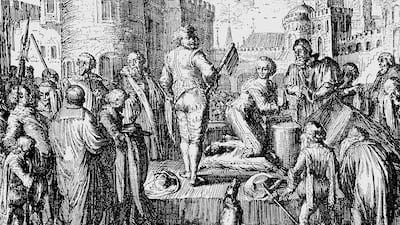Shakespeare scholar Clare Asquith follows up her vigorously thought-provoking 2005 book Shadowplay: The Hidden Beliefs and Coded Politics of William Shakespeare with a new study of the hidden meanings in some of the most famous writings in the world. Shakespeare and the Resistance: The Earl of Southampton, the Essex Rebellion, and the Poems That Challenged Tudor Tyranny once again digs beneath the surface of Shakespeare's words to unearth subtexts that are obscure to modern readers, but would have been clarion-loud to Shakespeare's original audience.
The ambit of the previous book was as broad as the Shakespeare canon itself. This new book has a narrower focus: two of the Bard's lesser-known narrative poems, Venus and Adonis from 1593 and The Rape of Lucrece from 1594, which were dedicated to Shakespeare's erstwhile patron Henry Wriothesley, Earl of Southampton. These poems are little-read for pleasure any more, and according to Shakespeare and the Resistance, they "remain impenetrable without historical context".
That context, it's argued, is the Essex Rebellion of 1601, in which Robert Devereux, the Earl of Essex, led a brief, abortive insurrection against Robert Cecil and most of his fellow members of Queen Elizabeth I's Privy Council, men who Devereux saw as thoroughly corrupt and, not incidentally, poisonous to his own ambitions.
For weeks, conspirators and various military men had been meeting at Essex House, plotting to wrest control of the government from the Cecil faction. And this planning had directly involved both Southampton, a star-struck adherent of Devereux, and, in a dramatic incident, Shakespeare and his work.
Shortly before the rebellion, several members of the Essex faction approached Shakespeare's company, the Lord Chamberlain's Men, about staging Shakespeare's Richard II, complete with the scene in which the king is deposed. Lord Monteagle, Sir Charles Percy, Sir Christopher Blount and others offered the naturally reluctant players a cash bonus of 40 shillings, and attended the subsequent performance, hoping the play would reconcile segments of the London populace to the idea of insurrection against a corrupted and ineffective monarch.
The insurrection fizzled, the popular support that Devereux was counting on never materialised, and all the conspirators were arrested. Devereux and other leaders were executed. Southampton was spared and sent to the Tower, where he remained until James I came to power.
___________________________
Read more:
Book review: 'Duterte Harry: Fire and Fury in the Philippines'
Book review: In the 'The Great Derangement' Amitav Ghosh urges us to confront climate change
Book review: 'Just a Shot Away' looks back on the 1969 Rolling Stones tragedy at Altamont
___________________________
Shakespeare scholars have long maintained that the Essex Rebellion was a catastrophe in the life of the playwright. He had openly praised Devereux at the end of his Henry V as "the general of our loving empress", and passages written after the rebellion's failure are unrelentingly dark, where in the new world order "things rank and gross in nature possess it merely".
Asquith challenges "the view that Shakespeare always subordinated the topical to the universal, that he never referred directly to events of his own time, and that if he had done so it would have made him in some way a lesser genius". The contrary view here is that Shakespeare was very much a writer of his time, deeply embroiled in the politics of the day; the dashed hopes of his patron, and the entrenched power of the Cecil faction (Shakespeare's patron, Southampton, had been the youthful ward of Robert Cecil's father, Lord Burghley, further complicating both the picture and the playwright's loyalties).
Asquith reminds her readers that Queen Elizabeth I "presided over a highly successful police state", and the man at the heart of that state, Robert Cecil, was a dedicated enemy of Devereux and all his cohorts. "Cecil's men now dominated all the areas which had previously been Lord Burghley's domain: the treasury, domestic politics, Ireland," Asquith writes. "And historians all agree on one point about the Cecils: if Burghley was corrupt, his son was doubly so."
In Shakespeare and the Resistance, Asquith puts the playwright's two narrative poems under a microscope, drawing hundreds of parallels between Shakespeare's gorgeous versifying and the power struggles going on at the highest levels of Elizabethan court. Venus and Adonis, for instance, "a work of genius that flew off the shelves", has a double meaning that Shakespeare's contemporaries would have been able to read clearly and that "would have brought Shakespeare instantly to the attention of people right across the country, but more particularly at court, who found themselves, metaphorically, in the position of the humiliatingly incapacitated Adonis, overwhelmed by the inescapable demands of a powerful queen".
Obviously, an endeavour such as this will be almost entirely constructed out of speculation. Asquith is better at this kind of speculation than any other Shakespeare scholar, but even so, the counter-narrative frequently creaks under the strain. Some of the book's claims are eyebrow-raising to say the least (foremost her contention that Devereux himself was "a political and intellectual heavyweight"), and the book's two main contentions – that Elizabeth's England was a ruthless and unsleeping police state, and that Shakespeare filled his very public poems and plays with easily decipherable incendiary references to current events – don't seem to sit well alongside each other. Asquith refers to the works of Shakespeare as his "overlooked diagnosis of the English malaise that would lead the country in civil war". Readers will be entertained, but they might not be convinced.

